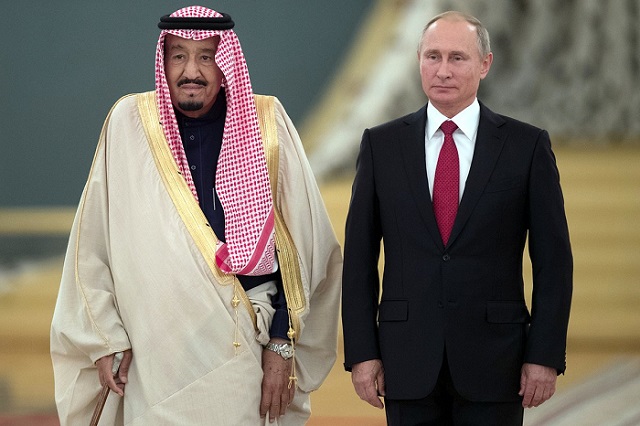
Moscow, Russia | AFP | Saudi Arabia’s King Salman, on a landmark visit to Russia, and President Vladimir Putin on Thursday signed a slew of arms and energy deals as the key US ally seeks to deepen cooperation with Moscow.
The leaders of the world’s largest energy exporters discussed an extension of an OPEC agreement to cap oil output and oversaw the signing of deals which officials said were worth billions of dollars.
Saudi Arabia signed preliminary agreements to buy Russia’s S-400 air defence systems and anti-tank guided missile systems and receive “cutting edge technologies,” said the Sunni state’s military firm, Saudi Arabian Military Industries.
The two countries also signed a series of multi-billion dollar investment deals including one to create a $1 billion fund to pursue energy projects.
“This is the first visit by a Saudi Arabian monarch in the history of our relations and that in itself is a landmark event,” Putin said as he welcomed 81-year-old King Salman to Moscow in an ornate gilded Kremlin hall.
“I’m sure your visit will boost the ties between our countries,” Putin added.
“We aim to strengthen our relations in the interests of peace and security, in the interests of developing the world economy,” the Saudi king responded.
Saudi Foreign Minister Adel al-Jubeir told journalists that “relations between Russia and Saudi Arabia have reached a historic moment.”
“Today we alone as the Russian Direct Investment Fund announced deals worth $2.1 billion,” said Kirill Dmitriyev, the head of the fund set up to attract investment.
Foreign Minister Sergei Lavrov said agreements came in the fields of “energy — not only traditional but also nuclear power — and also in cooperation in space exploration (and) agroindustry and infrastructure projects.”
– ‘Diversifying risks’ –
Saudi Arabia is the country that buys the most US arms and Washington and Riyadh in May announced a $110 billion deal to sell weapons to Saudi Arabia.
But Saudi, a long-standing ally of Washington, is keen to boost ties with Moscow as a major player in the Syrian conflict and a fellow oil producer with shared interests in supporting energy prices.
 The Independent Uganda: You get the Truth we Pay the Price
The Independent Uganda: You get the Truth we Pay the Price





